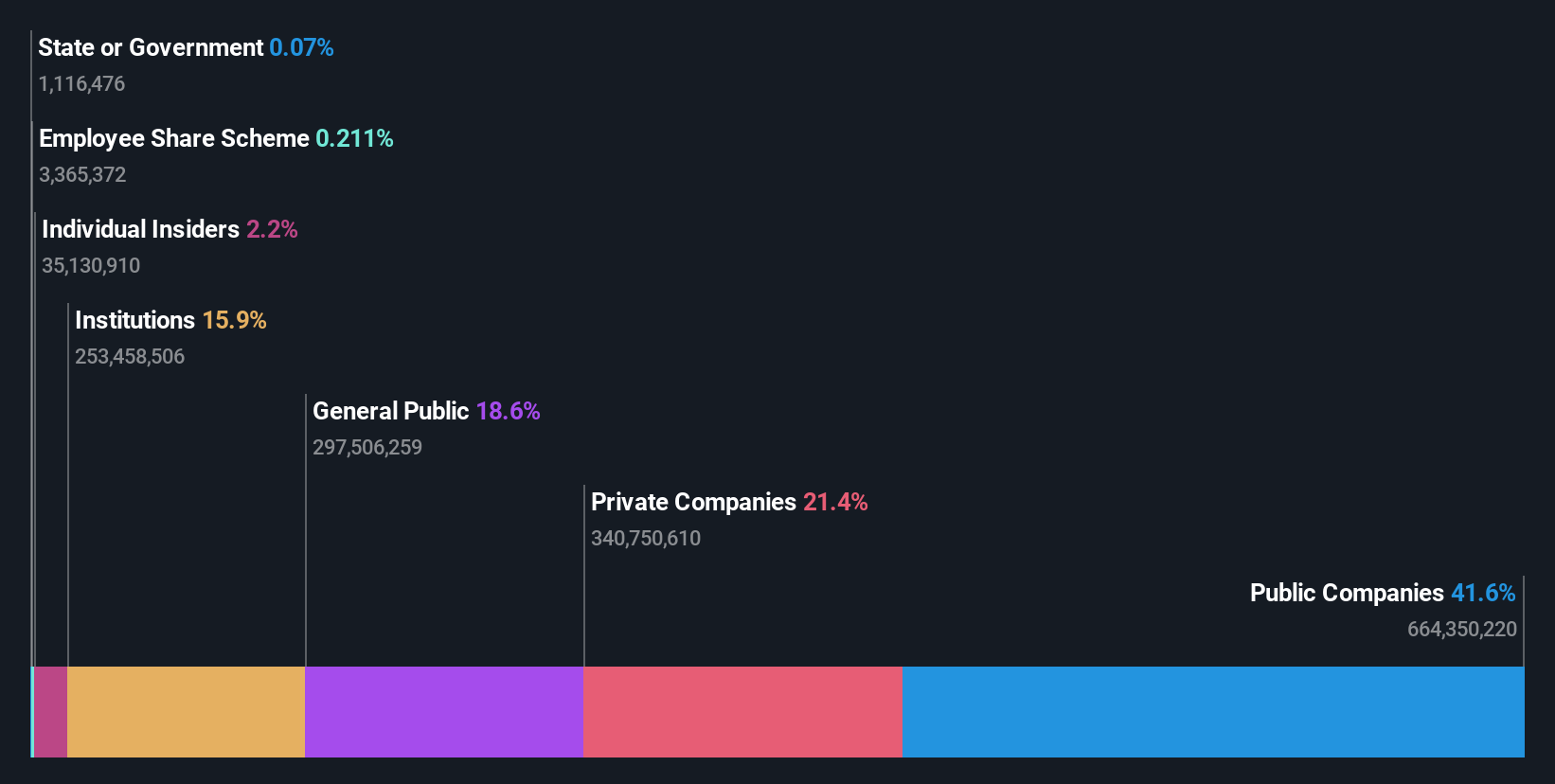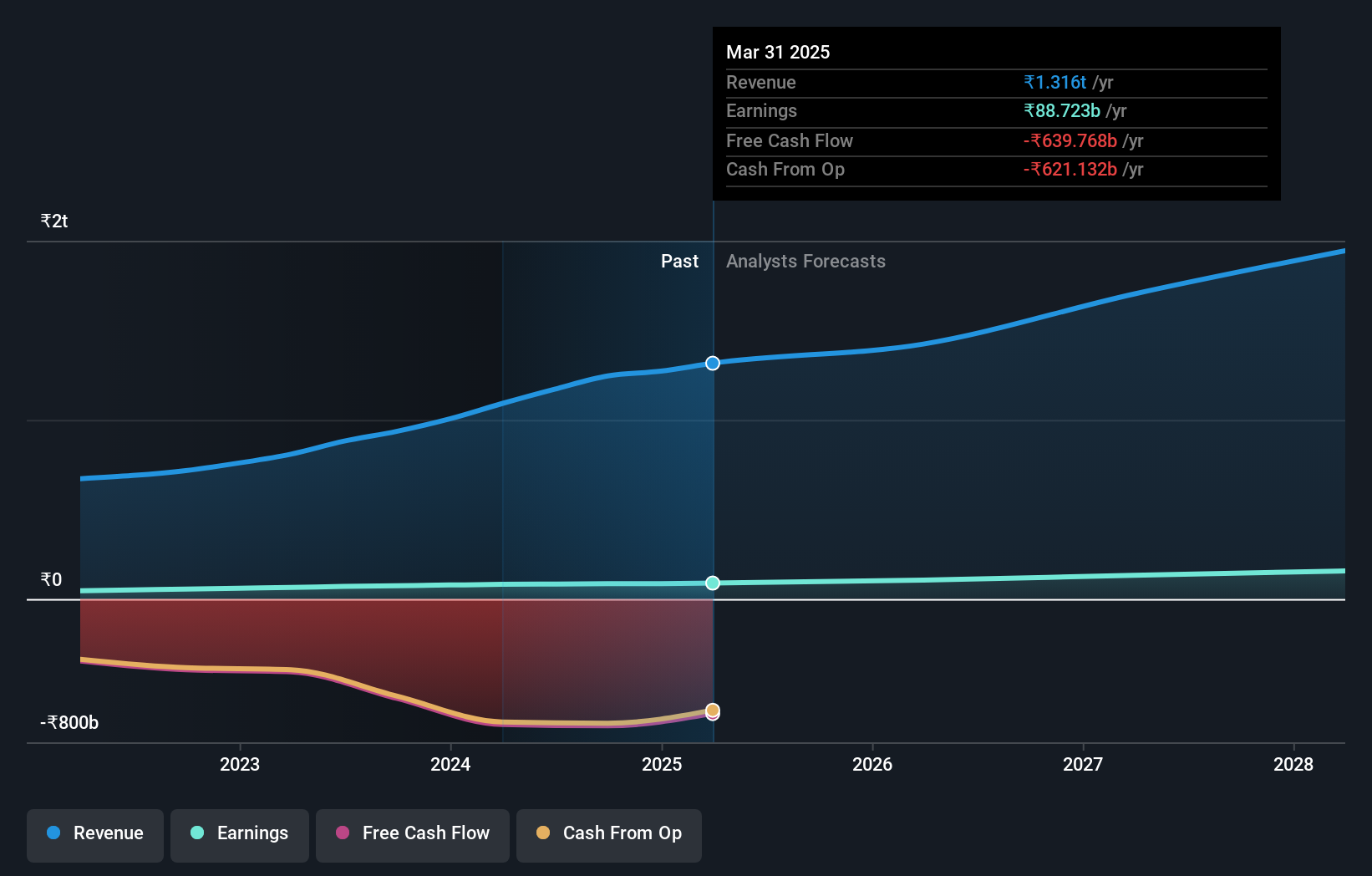- India
- /
- Diversified Financial
- /
- NSEI:BAJAJFINSV
Bajaj Finserv Ltd.'s (NSE:BAJAJFINSV) largest shareholders are public companies with 42% ownership, private companies own 21%
Key Insights
- The considerable ownership by public companies in Bajaj Finserv indicates that they collectively have a greater say in management and business strategy
- 54% of the business is held by the top 2 shareholders
- 16% of Bajaj Finserv is held by Institutions
To get a sense of who is truly in control of Bajaj Finserv Ltd. (NSE:BAJAJFINSV), it is important to understand the ownership structure of the business. With 42% stake, public companies possess the maximum shares in the company. That is, the group stands to benefit the most if the stock rises (or lose the most if there is a downturn).
And private companies on the other hand have a 21% ownership in the company.
Let's delve deeper into each type of owner of Bajaj Finserv, beginning with the chart below.
Check out our latest analysis for Bajaj Finserv

What Does The Institutional Ownership Tell Us About Bajaj Finserv?
Institutional investors commonly compare their own returns to the returns of a commonly followed index. So they generally do consider buying larger companies that are included in the relevant benchmark index.
We can see that Bajaj Finserv does have institutional investors; and they hold a good portion of the company's stock. This suggests some credibility amongst professional investors. But we can't rely on that fact alone since institutions make bad investments sometimes, just like everyone does. It is not uncommon to see a big share price drop if two large institutional investors try to sell out of a stock at the same time. So it is worth checking the past earnings trajectory of Bajaj Finserv, (below). Of course, keep in mind that there are other factors to consider, too.

Bajaj Finserv is not owned by hedge funds. Bajaj Holdings & Investment Limited is currently the company's largest shareholder with 42% of shares outstanding. For context, the second largest shareholder holds about 13% of the shares outstanding, followed by an ownership of 3.9% by the third-largest shareholder.
A more detailed study of the shareholder registry showed us that 2 of the top shareholders have a considerable amount of ownership in the company, via their 54% stake.
While studying institutional ownership for a company can add value to your research, it is also a good practice to research analyst recommendations to get a deeper understand of a stock's expected performance. There are plenty of analysts covering the stock, so it might be worth seeing what they are forecasting, too.
Insider Ownership Of Bajaj Finserv
The definition of company insiders can be subjective and does vary between jurisdictions. Our data reflects individual insiders, capturing board members at the very least. The company management answer to the board and the latter should represent the interests of shareholders. Notably, sometimes top-level managers are on the board themselves.
Insider ownership is positive when it signals leadership are thinking like the true owners of the company. However, high insider ownership can also give immense power to a small group within the company. This can be negative in some circumstances.
We can see that insiders own shares in Bajaj Finserv Ltd.. It is a very large company, and board members collectively own ₹71b worth of shares (at current prices). It is good to see this level of investment. You can check here to see if those insiders have been buying recently.
General Public Ownership
With a 19% ownership, the general public, mostly comprising of individual investors, have some degree of sway over Bajaj Finserv. While this size of ownership may not be enough to sway a policy decision in their favour, they can still make a collective impact on company policies.
Private Company Ownership
Our data indicates that Private Companies hold 21%, of the company's shares. It's hard to draw any conclusions from this fact alone, so its worth looking into who owns those private companies. Sometimes insiders or other related parties have an interest in shares in a public company through a separate private company.
Public Company Ownership
We can see that public companies hold 42% of the Bajaj Finserv shares on issue. We can't be certain but it is quite possible this is a strategic stake. The businesses may be similar, or work together.

Next Steps:
I find it very interesting to look at who exactly owns a company. But to truly gain insight, we need to consider other information, too. Consider risks, for instance. Every company has them, and we've spotted 2 warning signs for Bajaj Finserv you should know about.
If you would prefer discover what analysts are predicting in terms of future growth, do not miss this free report on analyst forecasts.
NB: Figures in this article are calculated using data from the last twelve months, which refer to the 12-month period ending on the last date of the month the financial statement is dated. This may not be consistent with full year annual report figures.
Valuation is complex, but we're here to simplify it.
Discover if Bajaj Finserv might be undervalued or overvalued with our detailed analysis, featuring fair value estimates, potential risks, dividends, insider trades, and its financial condition.
Access Free AnalysisHave feedback on this article? Concerned about the content? Get in touch with us directly. Alternatively, email editorial-team (at) simplywallst.com.
This article by Simply Wall St is general in nature. We provide commentary based on historical data and analyst forecasts only using an unbiased methodology and our articles are not intended to be financial advice. It does not constitute a recommendation to buy or sell any stock, and does not take account of your objectives, or your financial situation. We aim to bring you long-term focused analysis driven by fundamental data. Note that our analysis may not factor in the latest price-sensitive company announcements or qualitative material. Simply Wall St has no position in any stocks mentioned.
About NSEI:BAJAJFINSV
Bajaj Finserv
Through its subsidiaries, provides financial services in India.
Reasonable growth potential with acceptable track record.
Market Insights
Community Narratives



